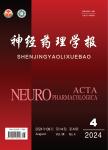Muscarinic Acetylcholine Receptors in Alcohol Use Disorder
Muscarinic Acetylcholine Receptors in Alcohol Use Disorder作者机构:Florey Institute of Neuroscience and Mental HealthParkvilleVictoriaFlorey Department of Neuroscience and Mental HealthUniversity of Melbourne
出 版 物:《神经药理学报》 (Acta Neuropharmacologica)
年 卷 期:2019年第Z1期
页 面:30-31页
学科分类:1002[医学-临床医学] 100205[医学-精神病与精神卫生学] 10[医学]
基 金:National Health&Medical Research Council of Australia grants 1116930 and 1120576
主 题:AUD Muscarinic Acetylcholine Receptors in Alcohol Use Disorder
摘 要:Background:Despite the large socioeconomic burden of alcohol use disorders(AUD),therapeutic treatment options are limited. There is a need to characterise the underlying neurochemistry driving alcohol seeking to identify and evaluate novel targets. AUDs are characterised by a transition to compulsive seeking,which is hypothesized to involve a shift from ventral to dorsal striatum and a medial to lateral dorsal striatal shift in the transition from goaldirected to habitual alcohol-seeking behaviours. Muscarinic acetylcholine receptors(mAChRs) are a potential target for AUD;they are expressed within the mesocorticolimbic reward system,including dense expression in the dorsal striatum,where they modulate dopamine and glutamate release,which may regulate reward processing. Methods:To assess the role of mAChRs in AUD,we first conducted genome-wide RNA sequencing in the caudate/putamen of 10 human alcoholics and 10 healthy controls and concurrently examined muscarinic receptor expression in the corresponding regions in rat(dorsolateral and dorsomedial striatum) following chronic alcohol consumption/withdrawal using qPCR. Next we examined the role of select muscarinic and nicotinic receptor subtypes in alcohol consumption and seeking using selective allosteric modulators. Finally,we probed the role of select muscarinic and nicotinic receptor subtypes in the dorsal striatum in alcohol consumption and seeking. Results:In human alcoholics M4 receptor expression was significantly decreased in the putamen. In line with this,M4 receptor expression was decreased in the rat dorsolateral striatum. Further,administration of VU154(30 mg·kg-1,p.o.) reduced alcohol self-administration and cue-induced relapse,without effects on natural reward consumption or sedation. We also found that a centrally active and selective negative allosteric modulator(NAM) for the rat M5 muscarinic receptor(mAChR),ML375,selectively decreases ethanol self-administration and attenuates cue-induced reinstateme



